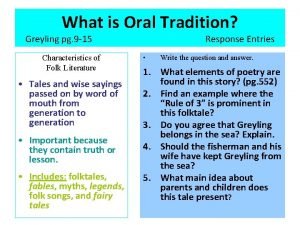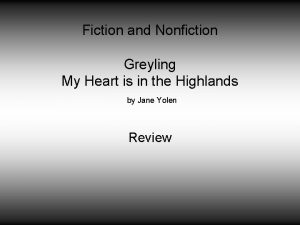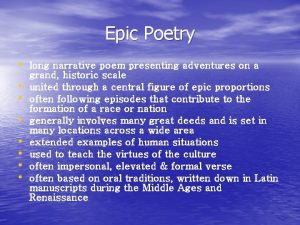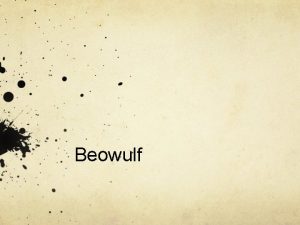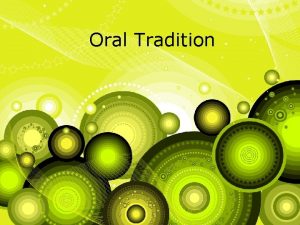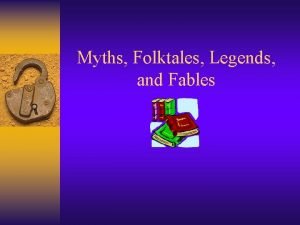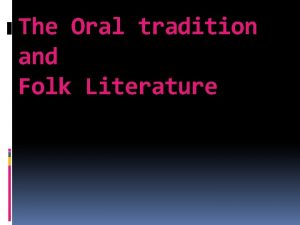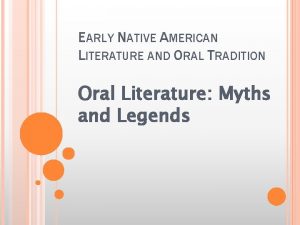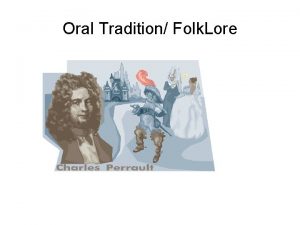What is Oral Tradition Greyling pg 9 15






- Slides: 6

What is Oral Tradition? Greyling pg. 9 -15 Characteristics of Folk Literature • Tales and wise sayings passed on by word of mouth from generation to generation • Important because they contain truth or lesson. • Includes: folktales, fables, myths, legends, folk songs, and fairy tales Response Entries • Write the question and answer. 1. What elements of poetry are found in this story? (pg. 552) 2. Find an example where the “Rule of 3” is prominent in this folktale? 3. Do you agree that Greyling belongs in the sea? Explain. 4. Should the fisherman and his wife have kept Greyling from the sea? 5. What main idea about parents and children does this tale present?

Universal Theme and Stylistic Elements Literature Textbook pg. 933 • A universal theme is a message about life that is found in traditional and classical literature from various cultures. – Ex: power of love, danger of greed • Stylistic Elements – A magic helper: a character with special powers. May help the main character learn a lesson. – The rule of 3: a trio of elements moves the plot to reveal an important message. Response Entries Model: The Three Wishes pg. 935 -938 Paired: The Stone pg. 942 -952 Independent: Critical Thinking Q’s • How does Maibon get the stone? Why does Maibon choose the stone over all the other gifts? • What happens when Maibon tries to throw away the stone? What new belief does Maibon have that finally allows him to rid himself of the stone? • What lesson is Doli trying to teach Maibon when he says that the stones are greatly overrated? • What universal theme is revealed in the folk tale after Doli explains why the stone would not go away? • How does the stylistic element of a magic helper reveal theme?

Cinderella Fairy Tale Objective: analyze and compare classic fairy tale across various cultures Fairy Tale Checklist Exposition Rising Action Events: 1, 2, 3 Climax Falling Action Events: 1 & 2 Dénouement Magic Helper Rule of 3 Universal Theme

Venn Diagram Title #2: _________ Title #1: _________ 1. Main Character 2. Setting 1. ____ 3. Problem 4. Solution 2. ____ 4. Solution 5. Magic Helper 3. ____ 5. Magic Helper 3. Problem 6. Rule of 3 7. Theme

Cinderella Book Activity Read both versions of the Cinderella story. Create a plot diagram for both stories. After reading, complete a Venn diagram to compare two stories. PROJECT: Use your knowledge of plot and traditional literature to create your OWN version of Cinderella. Using the rubric. Fairy Tale Rubric Cover Page: Title 5 pts Elements of Plot 40 pts At least 4 pages (front and back) 10 pts Back Cover with 10 pts synopsis & theme Creativity 15 pts Illustrations 10 pts Presentation 10 pts

Page # Plot Element Front Cover Title, Illustration, Author’s name 1. Exposition 2. Rising Action #1 3. Rising Action #2 4. Rising Action #3 5. Climax (include magic helper and rule of three) Fairy Tale Rubric Cover Page: Title 5 pts Elements of Plot 40 pts At least 4 pages (front and back) 10 pts Back Cover with 10 pts synopsis & theme Creativity 15 pts 6. Falling Action #1 7. Falling Action #2 Illustrations 10 pts 8. Denouement Presentation 10 pts Back Cover Synopsis and Theme *Alternative Assignment: Read Textbook pg. 915 -928. On a separate piece of paper, Answer questions #1 -4 on pg. 920 and questions #1 -3 on pg. 928.
